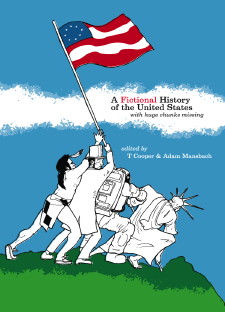| |
 A Fictional History of the United States With Huge
Chunks Missing A Fictional History of the United States With Huge
Chunks Missing
edited by T Cooper and Adam Mansbach Akashic Books
Contribtors include Ron Kovic, Amy Bloom, Darrin Strauss,
David Rees, Neal Pollack, Daniel Alarcon, Paul LaFarge, Alexander Chee,
Benjamin Weissman, Kate Bornstein, Adam Mansbach, T Cooper, Felicia
Luna Lemus, Sarah Schulman, Thomas O'Malley, Keith Knight, and Valerie
Miner.
PURCHASE
INTRODUCTION
Dear Reader, Browser, or Shoplifter:
Those who
forget history are doomed to repeat it. We can’t remember
who said that, so here we are repeating it.
We’re Americans, and as such, we can’t remember shit. Perhaps
that’s why, as we write this, the massive, orchestrated effort
by the current administration to revise history even as it occurs is
experiencing almost total success. Events are being reduced to sound
bites; sound bites are becoming mantras. The truth -- if you edit carefully
enough, omit artfully enough, distort brazenly enough -- becomes lies.
And lies, if repeated relentlessly, become truth. Especially if they
are wedged immovably between the covers of the kind of history text
that bored you to tears in high school.
You ever wonder how it’s possible that history – the story
of everything that’s ever happened – got so damn sterile
and uninteresting that you and your friends spent most of tenth-grade
American History ditching to smoke cigarettes in the parking lot?
Well, to haul out another old saw, it’s because history is
written by the winners. Those stale-ass textbooks, just like our
received cultural memories, are packed with names, dates, places, and
single-sentence summaries of events that, in reality, resonated differently
for hundreds of millions of people.
The goal of this collection is to move beyond the obvious and the canonical:
to challenge, tease, and expand upon the hegemonic single-narrative
of mainstream American history. Here are some of the moments and people
left out of the textbooks. Here is what else happened on some of the
dates and during many of the eras we were forced to memorize in school
or take into the stride of our daily lives.
So why use fiction as the way to get at the truth? Two reasons. The
first is because that’s what the best fiction is: a lie that reveals
the truth. (That’s somebody else’s line too, by the way.
We’re most likely totally mangling it, but since we can’t
remember who said that one either, let’s just apologize to their
estate and move on.)
The second reason is that history is fiction. How can it not be? History
becomes fiction the minute someone attempts to write it down, to re-tell
it in any way, shape or form. So much intervenes between the moment
history unfolds and any attempt to relay it: power, pain, bias, sadness,
tragedy, elation, time, fear, desire--to name just a few. Plus, there’s
the problem of who gets to tell the story. Howard Zinn addresses this
issue beautifully in his important, comprehensive book, A People’s
History of the United States. In fact, that was a title we considered
borrowing for this book – you know, doing the little cutesy thing
where you insert an extra word with a little arrow:
Fictional
A People’s /\ History of the United States
Because in some ways, this collection is meant to be in the spirit of
Zinn’s book. These stories take up the same challenge of speaking
for the voiceless--who all too often are voiceless because somebody
who will later be made into a statue is standing on their necks.
As you can see, the name of the book ended up being A Fictional
History of the United States With Huge Chunks Missing. This is
simply an accurate description, not an attempt to pre-empt readers who
might ask questions like, "What about the Watts Riots?" or
"What about Eleanor Roosevelt's purported lesbian relationships?”
To such questions, we say: Right! Good point, boss! What about those
things, and so much more? How about the entire eighteenth century, for
instance? We totally left that out. By all means, write a letter to
your favorite author, asking him or her (or anywhere in between), exactly
why they did not take up a particular historical incident or event and
contribute it to this anthology.
But even if every author in America had returned our e-mails and letters
(and in one case, text messages), this would still be a patchwork history,
an anecdotal history, one with huge chunks missing. The stories in this
book reflect the moments that moved this particular, eclectic batch
of gifted and courageous writers and cartoonists. Of course, there are
millions more stories, and we hope this collection provides some impetus
for them to be told. We think the seventeen pieces that did make it
between these covers are riveting, inventive, timely, funny, and --
most pressingly for us -- politically imperative.
A Fictional History of the United States with Huge Chunks Missing picks up -- and yanks on -- the thread of America's supposed commitment
to seeking the truth... even if that truth happens to be revealed in
fiction.
T Cooper & Adam Mansbach
New York City
August 2006 |
|

